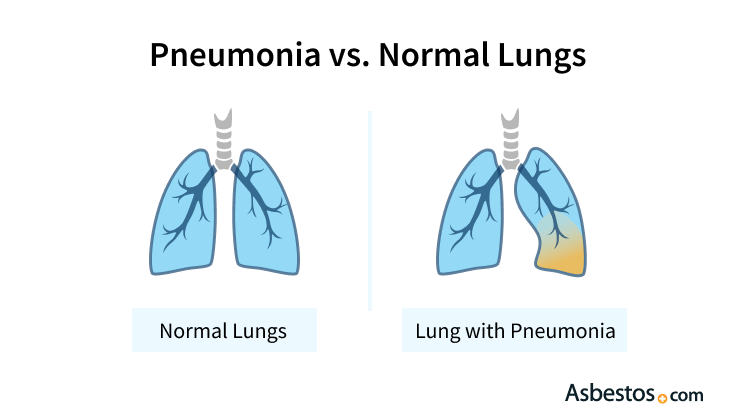Get in Touch
Have questions? Call or chat with our Patient Advocates for answers.
The symptoms of mesothelioma often mimic more common conditions. Doctors may misdiagnose mesothelioma as the flu, pneumonia or other illnesses. These conditions can be life-threatening for patients with compromised immune systems, such as those already diagnosed with mesothelioma.
Written by Karen Selby, RN | Medically Reviewed By Dr. Jeffrey Velotta | Edited By Walter Pacheco | Last Update: August 8, 2024
The symptoms of mesothelioma make it challenging to differentiate between it and other, more common diseases. In the early stages, mesothelioma has very few symptoms. As cancer progresses, symptoms become more noticeable.
The early warning signs of mesothelioma are often written off as other, less severe conditions.
Pleural mesothelioma develops on the lining of the lungs. Early signs include a dry cough, difficulty breathing, fever and chest pain. These symptoms mimic a respiratory infection like the flu. Cancer can also mimic symptoms of lower respiratory diseases such as bronchitis and pneumonia.
Peritoneal mesothelioma forms on the abdomen lining and can resemble common digestive conditions such as inflammatory bowel disease and irritable bowel syndrome.
Regardless of the type, misdiagnoses of mesothelioma are common and can delay cancer treatment by several months or even more than a year. A 2021 research study noted that, in some cases, mesothelioma patients may not receive treatment until six months after their initial symptoms.
It took a year and a half and five misdiagnoses for peritoneal mesothelioma survivor Kasie Coleman to find the actual cause of her severe abdominal pain. Doctors thought she had chlamydia, gallstones and ovarian cancer before she was diagnosed correctly.
Diagnosing mesothelioma accurately and as early as possible leads to more treatment options and more prolonged survival. Most doctors don’t consider mesothelioma when treating a patient with shortness of breath, fever or chest pain, mainly during flu season or if the patient has a history of respiratory infections.
Know the common symptoms of mesothelioma. If you have a history of asbestos exposure, seek a second opinion from a mesothelioma specialist.
Someone already diagnosed with mesothelioma is more susceptible to flu complications or pneumonia. While these conditions go away on their own or are treatable for people in good health, they can devastate a patient’s health.
Mesothelioma patients need to take steps to avoid viruses and infection.
The symptoms related to a mesothelioma diagnosis are very similar to other lung-related issues. I tell patients to always let their doctor know of any exposure to asbestos they may have had in the past and to encourage their doctor to rule out mesothelioma or other related asbestos diseases. In some instances, it may also help to obtain a second opinion.

The flu is a viral infection that attacks your respiratory system. While the common cold develops slowly, flu symptoms typically come on suddenly. They are also more intense and can last longer than the average cold.
The risk of mesothelioma misdiagnosis increases during flu season. Flu symptoms usually ease in two to five days, but a mild cough or sore throat can last two or more weeks.
If flu-like symptoms persist or get worse, see your doctor for another diagnosis, especially if you have a history of asbestos exposure and suspect you may have mesothelioma.
Age can also make distinguishing between the flu and mesothelioma difficult. Adults older than 65 are at higher risk of developing the flu, and most mesothelioma patients are diagnosed at age 65 or older because of the long latency associated with this cancer.
Flu season happens every year. No one wants it, but people who are healthy and get the flu can usually shake it within a week without complications.
It is unknown if cancer patients are more likely to get the flu than other people. However, those diagnosed with cancer that affects respiratory functions, such as mesothelioma, are at greater risk of having severe problems if they get the flu.
Complications From Influenza Virus
These complications often require hospitalization and may result in death. The flu virus can also significantly impact cancer care, including delaying treatment regimens such as chemotherapy and immunotherapy.
The American Cancer Society recommends getting a flu shot for most cancer patients. However, mesothelioma patients should talk to their doctor to make the right decision. Specific cancer treatments, such as chemotherapy, may cause the flu vaccine not to work as well or not work at all.
The Centers for Disease Control and Prevention recommend that family members, caregivers and anyone else who may be around a cancer patient get a flu shot to prevent the spreading of the virus.
Pneumonia is a common lung infection caused by bacteria, viruses or fungi. The flu virus is a common cause of viral pneumonia in adults.

The symptoms of later-stage mesothelioma are very close to symptoms of pneumonia. The most common similarity is a pleural effusion, a buildup of fluid between tissues that line the outer surface of the lungs and the inside of the rib cage.
Signs of Pneumonia That Resemble Pleural Mesothelioma Symptoms
The pleural fluid resulting from pneumonia or lung abscess is called parapneumonic effusion (PPE).
According to a 2007 study in Clinical Infectious Diseases, 20 to 57 percent of the 1 million patients hospitalized with pneumonia each year in the U.S. develop PPE.
Pleural effusions occur in approximately 90 percent of pleural mesothelioma cases, causing shortness of breath, dry cough and sharp chest pains. Recurring pleural effusions are a common warning sign of mesothelioma cancer.
Pneumonia can be life-threatening, especially for people diagnosed with cancer. Fighting off the infection can be very challenging for pleural mesothelioma patients.
Contracting pneumonia while battling mesothelioma can result in more extended hospital stays, a decreased ability to tolerate treatments and even death.
Identifying pneumonia if you have pleural mesothelioma may be more complex because the symptoms are similar.

Eating the right diet throughout mesothelioma treatment can ease your symptoms.
Get Free Recipes and TipsChronic obstructive pulmonary disease is a chronic lung disease that makes it hard for you to breathe. The two main types of COPD are chronic bronchitis and emphysema.
Most people with COPD experience a little bit of both, with a predominance of one or the other. Like mesothelioma, most people with COPD don’t experience symptoms until the later stages of the disease.
Other symptoms of COPD include blueness in the lips or fingernail beds, frequent respiratory infections and the production of a lot of mucus.
Cigarette smoking causes about 85 to 90 percent of all COPD cases. Environmental toxins like pollution, chemical fumes or asbestos exposure can also trigger the condition. Asbestos exposure is the overwhelming cause of mesothelioma.
It is not uncommon for mesothelioma patients to also have COPD, which may develop before or after the cancer diagnosis.
The causes of the two diseases also overlap. Smoking is the leading cause of COPD and can worsen the symptoms of mesothelioma, while asbestos exposure can increase the likelihood of someone developing COPD.
COPD has no cure, but the condition is treatable. Many people live long lives with COPD.
However, COPD can worsen pleural mesothelioma symptoms and make treating cancer more difficult.
Asthma is a chronic lung disease that causes increased mucus and inflammation in the airways.
In this way, it is similar to chronic bronchitis, which COPD can cause. However, asthma is usually diagnosed earlier in life and is associated with allergies.
Asthma is not curable but can be controlled with medication and therapy. Some children with asthma grow out of it in adulthood.
Asthma symptoms may be constant or come and go during asthma attacks.
Asthma attacks can be triggered by exercise, stress or exposure to allergens.
Occupational asthma can be caused by exposure to industrial dust, including asbestos. But most cases have nothing to do with asbestos, while mesothelioma is almost exclusively caused by asbestos exposure.
Asthma is a relatively common illness. Doctors may misdiagnose pleural mesothelioma signs as asthma symptoms. A delay in diagnosis could lead to more limited treatment options for mesothelioma.
Having asthma at the same time as mesothelioma can worsen breathing difficulties.
Patients must work with their medical team to ensure their asthma is well controlled during cancer treatment while avoiding potentially harmful drug interactions.
Because peritoneal mesothelioma is so rare, doctors commonly misdiagnose it as an illness with similar symptoms, such as inflammatory bowel disease or irritable bowel syndrome.
Peritoneal mesothelioma is the second most common type of this cancer, accounting for roughly 20% of all cases.
Inflammatory bowel disease (IBD) refers to two conditions: Ulcerative colitis and Crohn’s disease.
Both are characterized by chronic inflammation of the gastrointestinal tract, but some differences exist.
A person with peritoneal mesothelioma may be misdiagnosed with IBD because of these symptoms. Doctors may mistake tumors for inflammation even with diagnostic imaging scans like MRIs and CT scans.
Irritable bowel syndrome (IBS) is a common disorder that affects the large intestine.
Unlike IBD, irritable bowel syndrome doesn’t damage the digestive tract or lead to other health problems. Changes in diet, mental health therapies and medicines for diarrhea or constipation can typically treat the condition.
If symptoms of IBS persist, the cause may be a more severe condition such as IBD or cancer.
An estimated 1 in 133 Americans have celiac disease, according to Beyond Celiac. It is a severe genetic autoimmune disorder where the ingestion of gluten damages the small intestine and makes it hard for the body to absorb essential nutrients.
Gluten is a common protein in foods like wheat, rye and barley.
Symptoms of celiac disease in adults overlap with many of the symptoms of peritoneal mesothelioma.
There is no treatment for celiac disease other than maintaining a gluten-free diet. It is estimated that 83 percent of people with the disorder do not know they have it. So, the onset of these symptoms could lead someone to believe they have another digestive condition or possibly a type of gastrointestinal cancer. However, several serologic (blood) tests can be used to screen for celiac disease antibodies.
Peritoneal mesothelioma patients can also have celiac disease. These patients should maintain a gluten-free diet to avoid worsening common peritoneal mesothelioma symptoms.
Recommended ReadingYour web browser is no longer supported by Microsoft. Update your browser for more security, speed and compatibility.
If you are looking for mesothelioma support, please contact our Patient Advocates at (855) 404-4592
The Mesothelioma Center at Asbestos.com has provided patients and their loved ones the most updated and reliable information on mesothelioma and asbestos exposure since 2006.
Our team of Patient Advocates includes a medical doctor, a registered nurse, health services administrators, veterans, VA-accredited Claims Agents, an oncology patient navigator and hospice care expert. Their combined expertise means we help any mesothelioma patient or loved one through every step of their cancer journey.
More than 30 contributors, including mesothelioma doctors, survivors, health care professionals and other experts, have peer-reviewed our website and written unique research-driven articles to ensure you get the highest-quality medical and health information.
My family has only the highest compliment for the assistance and support that we received from The Mesothelioma Center. This is a staff of compassionate and knowledgeable individuals who respect what your family is experiencing and who go the extra mile to make an unfortunate diagnosis less stressful. Information and assistance were provided by The Mesothelioma Center at no cost to our family.LashawnMesothelioma patient’s daughter


Selby, K. (2024, August 8). Conditions That Resemble or Worsen Mesothelioma. Asbestos.com. Retrieved October 22, 2024, from https://www.asbestos.com/mesothelioma/symptoms/similar/
Selby, Karen. "Conditions That Resemble or Worsen Mesothelioma." Asbestos.com, 8 Aug 2024, https://www.asbestos.com/mesothelioma/symptoms/similar/.
Selby, Karen. "Conditions That Resemble or Worsen Mesothelioma." Asbestos.com. Last modified August 8, 2024. https://www.asbestos.com/mesothelioma/symptoms/similar/.
A medical doctor who specializes in mesothelioma or cancer treatment reviewed the content on this page to ensure it meets current medical standards and accuracy.
Please read our editorial guidelines to learn more about our content creation and review process.
Dr. Jeffrey Velotta is an experienced thoracic surgeon and pleural mesothelioma specialist at Kaiser Permanente Oakland Medical Center in California. Velotta also serves as an assistant professor at the University of California, San Francisco.
Mesothelioma Center - Vital Services for Cancer Patients & Families doesn’t believe in selling customer information. However, as required by the new California Consumer Privacy Act (CCPA), you may record your preference to view or remove your personal information by completing the form below.
